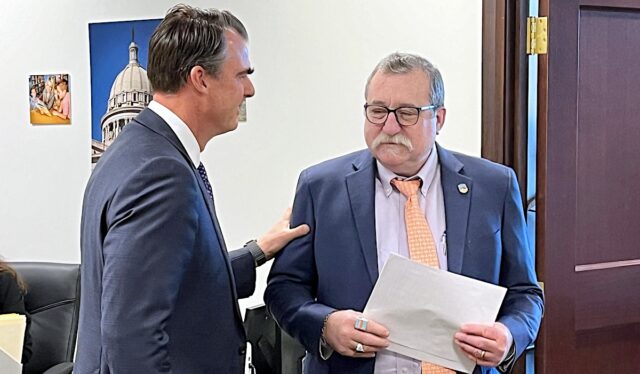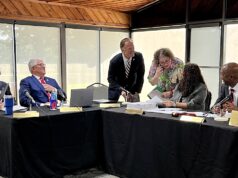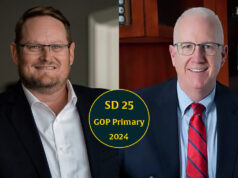
Gov. Kevin Stitt announced this afternoon that he vetoed five bills passed by the Oklahoma Legislature in the final days of its regular session. He also quietly line-item vetoed a budget-limits bill that had provoked the ire of State Superintendent of Public Instruction Ryan Walters, but the governor issued an executive order dealing with the same topic to apply restrictions statewide.
Stitt vetoed:
- HB 2919, which would have increased the maximum number of full-time employees allowed at the State Board of Medical Licensure and Supervision and the State Board of Osteopathic Examiners. (Stitt said he vetoed the bill “because Oklahomans want and need smaller government, these increases are simply unnecessary”);
- HB 1035, which would have required school districts to excuse students who miss class for mental health counseling or occupational therapy. (Stitt said those decisions should be left to local school districts);
- SB 1167, which would have increased per-diem payments for private prisons. (Stitt said the bill ran contrary to his priorities of “fiscal responsibility and slowing the growth of government.” In 2022, he vetoed a similar bill increasing payments to private prisons, but irritated legislators overrode him and pushed the private prison funding into law, something they cannot do this year after waiting until the final week of session to pass a budget.);
- SB 453, which would have increased pensions for volunteer firefighters. (Stitt called his veto an act of “fiscal discipline”);
- SB 631, which would have reinstated retirement pay for law enforcement officers who first began participating in the retirement system on or after Nov. 1, 2012. (Stitt also called his veto for SB 631 an act of “fiscal discipline”).
Although he did not announce it in his press release, Stitt also line-item vetoed two sections of Senate Bill 1122, which outlined certain budgetary requirements for the State Department of Education. One vetoed section specifically attempted to prohibit OSDE expenditures “for the purpose of securing media interviews, public relations, or other public promotional purposes unless expressly required to participate in a federal grant program.”
House Appropriations and Budget Education Subcommittee Chairman Mark McBride (R-Moore) and other legislators added the section to the bill after Oklahoma Watch and Fox 25 reported in March that OSDE had hired Vought Strategies, an Arlington, Virginia, communications firm, to coordinate “national events and appearances” that have boosted Walters’ image around the country.
Stitt vetoed that section and another section that would have required OSDE to get permission from the Senate president pro tempore and speaker of the House before declining to pursue federal grants it had previously obtained. That language was included in legislators’ OSDE limits bill last year, which Stitt let become law.
“Sections 15 and 16 of Senate Bill [1122] impose a statutory prohibition on one statewide elected official and impedes the State Department of Education from fulfilling its duties and obligations to our students,” Stitt wrote in his veto message.
Stitt also said the language of SB 1122’s PR contract prohibition could prevent OSDE from “recruiting teachers” or “addressing constituent concerns.”
Walters had engaged in a fierce lobbying campaign against the section prohibiting PR contracts, even sending out a letter to supporters telling them to contact the governor’s office and ask Stitt to veto the bill.
Walters celebrated Stitt’s line-item veto in a statement that lumped House Speaker Charles McCall (R-Atoka) in with the usual targets of his derision.
“The efforts of the teachers unions, radical RINO leftist Mark McBride, and Speaker McCall failed. This is an unprecedented attack on me and my office and resulted in a disgraceful attempt to silence millions of Oklahoma parents,” Walters said. “Oklahomans are not fooled by the political gamesmanship and reached out in huge numbers to remind everyone that the parents are in charge and want schools free of woke indoctrination, radical gender games, and critical race theory, and are demanding common sense outcomes for their kids.”
Some legislators celebrated Stitt’s line-item vetoes in a statement Friday.
“We’d like to thank Governor Stitt for his thoughtful line-item veto of Sections 15 and 16 of Senate Bill 1122,” they said. “These portions of the bill would have done nothing to improve the education of Oklahoma students and instead would have significantly damaged the Department of Education’s ability to carry out its mission.”
The lawmakers who issued the statement were:
- Rep. Chad Caldwell (R-Enid);
- Rep. Chris Banning (R-Bixby);
- Rep. Sherrie Conley (R-Newcastle);
- Rep. Rusty Cornwell (R-Vinita);
- Rep. Denise Crosswhite Hader (R-Piedmont);
- Rep. David Hardin (R-Stilwell);
- Rep. Justin Humphrey (R-Lane);
- Rep. Tom Gann (R-Inola);
- Rep. Jim Grego (R-Wilburton);
- Rep. Mark Lawson (R-Sapulpa);
- Rep. Mark Lepak (R-Claremore);
- Rep. Cody Maynard (R-Durant);
- Rep. Jim Olsen (R-Roland);
- Rep. Clay Staires (R-Skiatook);
- Rep. Kevin West (R-Moore); and
- Rep. Rick West (R-Heavener).
Stitt issues executive order, impact unclear on OSDE contracts
Despite Stitt’s modifications to SB 1122, Walters could still face greater difficulty executing the types of public relations contracts that sparked the section of the bill in the first place.
Stitt issued an executive order Friday prohibiting all state agencies “from entering into sole source contracts with PR/marketing/communications vendors.” Additionally, the executive order prohibits state agencies, agency directors or state employees from using “any tax dollars, spent in- or outside the state, for the purpose of self-promotion or for the promotion of any matter outside the scope of the state agency.”
McBride praised Stitt’s executive order Friday, saying he liked that it would remain in effect for more than the year-long force of law SB 1122 holds.
“I think that the governor did the right thing. I have no problem with him doing the line-item veto,” McBride said. “His executive order was matter-of-fact and to the point that we can’t allow this at any agency in the state. It’s our duty to protect taxpayer dollars and not to be used for self-promotion.”
But Dan Isett, an OSDE spokesman, said Stitt’s executive order “does not affect any existing vendor contracts at OSDE” because he said they were not “sole-source” agreements.
“Nothing in the EO affects any of our existing contracts,” Isett said by phone. “It doesn’t affect what we’ve been doing.”
Although the order does ban single-source contracts, it also bans all PR contracts used for self promotion or campaigning, and it prohibits agencies from signing any contract — sole-source or open bid — with entities engaged in campaign work:
No PR vendor shall have an active contract related to any campaign-related matter (i.e., candidates or issues/questions that will appear on a ballot), state question initiative, or policy-based 501(c)(4) at the time of their bid submission to an RFP for PR/marketing/communications nor during the term of any resulting contract.
Isset said neither company hired currently by OSDE — Vought Strategies and Precision Outreach — has political contracts that would prevent their provision of service.
McBride questioned Isset’s interpretation.
“What I say about OSDE is they deflect, delay, deny,” McBride said. “That’s what they do.”





















